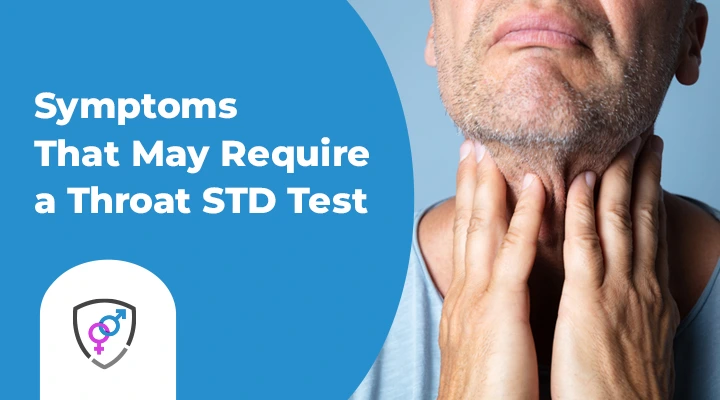Oral sex can expose you to STDs like gonorrhea, syphilis, and herpes, not just in the genitals but in the throat too. If you have a persistent sore throat, white patches, or swollen glands, it might be time for a throat STD test. Get tested quickly and confidentially in NYC to protect your health and your peace of mind.
What Is a Throat STD and How Is It Transmitted?
At Manhattan STD Testing, we specialize in discreet, accurate throat STD testing to help you stay informed and protected.
A throat STD or oral STD refers to a sexually transmitted infection that affects the mouth, throat, or tonsils. Common culprits include:
- Gonorrhea in the throat (oral gonorrhea)
- Syphilis in the mouth or tongue (syphilis tongue)
- Herpes (HSV) causes oral lesions or blisters
These infections are typically transmitted through oral sex, including both giving and receiving. In some cases, deep kissing (especially with open sores) can also spread STDs like herpes, making timely herpes testing important for early detection.
High-Risk Behaviors Include:
- Unprotected sex
- Multiple sexual partners
- Presence of oral sores or cuts
Common Signs of a Throat STD
You might be wondering: “What are the symptoms of an STD in your throat?“ Here are some common signs:
- Persistent sore throat that doesn’t improve with typical remedies
- White patches, redness, or irritation on the throat, tongue, or tonsils
- Painful swallowing or swollen lymph nodes
- Sores on the lips, tongue, or tonsils (STD on lips, STD on tonsils)
- No symptoms at all
That’s right—you can have an oral STD without visible symptoms, which is why regular testing is so important. It’s also helpful to recognize broader STD symptoms that may not always be obvious.
Why Testing Matters
Early detection is key to protecting your health and the health of others. Regular STD testing plays a major role. A throat STD test can:
- Prevent transmission to partners
- Help you get prompt treatment for infections like gonorrhea and syphilis
- Provide peace of mind when symptoms are ambiguous
Left untreated, these infections can lead to complications like systemic spread, painful outbreaks, or even infertility.
How to Get Tested for a Throat STD
Testing for throat STDs is quick and painless. At Manhattan STD Testing, we offer gonorrhea testing as part of our comprehensive oral STD panel. It usually involves:
- An oral swab or throat culture
- Sometimes paired with blood tests, depending on symptoms
If you’re in NYC, Manhattan STD Testing offers confidential, fast, and professional throat STD tests to make the process simple and stress-free.
What to Do If You Test Positive for a Throat STD
First: Don’t panic. Most oral STDs are treatable, especially when caught early.
Treatment May Include:
- Antibiotics for bacterial infections like gonorrhea in the throat or syphilis
- Antivirals for herpes management
- Follow-up testing to confirm clearance
Practice safe sex, avoid oral contact during outbreaks, and stay on top of your checkups to prevent reinfection.
Final Thoughts
A sore throat might not just be allergies or a cold. If you’ve had unprotected oral sex or have unexplained throat symptoms, a throat STD test can give you clarity.
Your health matters. And with convenient testing options in NYC, there’s no reason to wait.
Book your throat STD test with Manhattan STD Testing today—because peace of mind starts with a single swab.
Frequently Asked Questions
Can I get a throat STD from sharing drinks or utensils?
No, throat STDs aren’t spread through sharing food or drinks—only through oral sex or deep kissing with an infected partner.
When should I get tested after oral sex?
Wait 7–14 days after exposure for accurate throat STD testing results.
Can throat STDs cause voice changes?
Yes, some may cause hoarseness or discomfort when speaking due to throat inflammation.
Is a sore throat after oral sex normal?
Sometimes, but if it lasts more than a few days, it could be a sign of an STD and should be checked.
Disclaimer
This blog is for informational & educational purposes only and does not intend to substitute any professional medical advice or consultation. For any health-related concerns, please consult with your physician, or call 911.

-
About The Author
Dr. Syra Hanif M.D.Board Certified Primary Care Physician
Dr. Syra Hanif is a board-certified Primary Care Physician (PCP) dedicated to providing compassionate, patient-centered healthcare.


